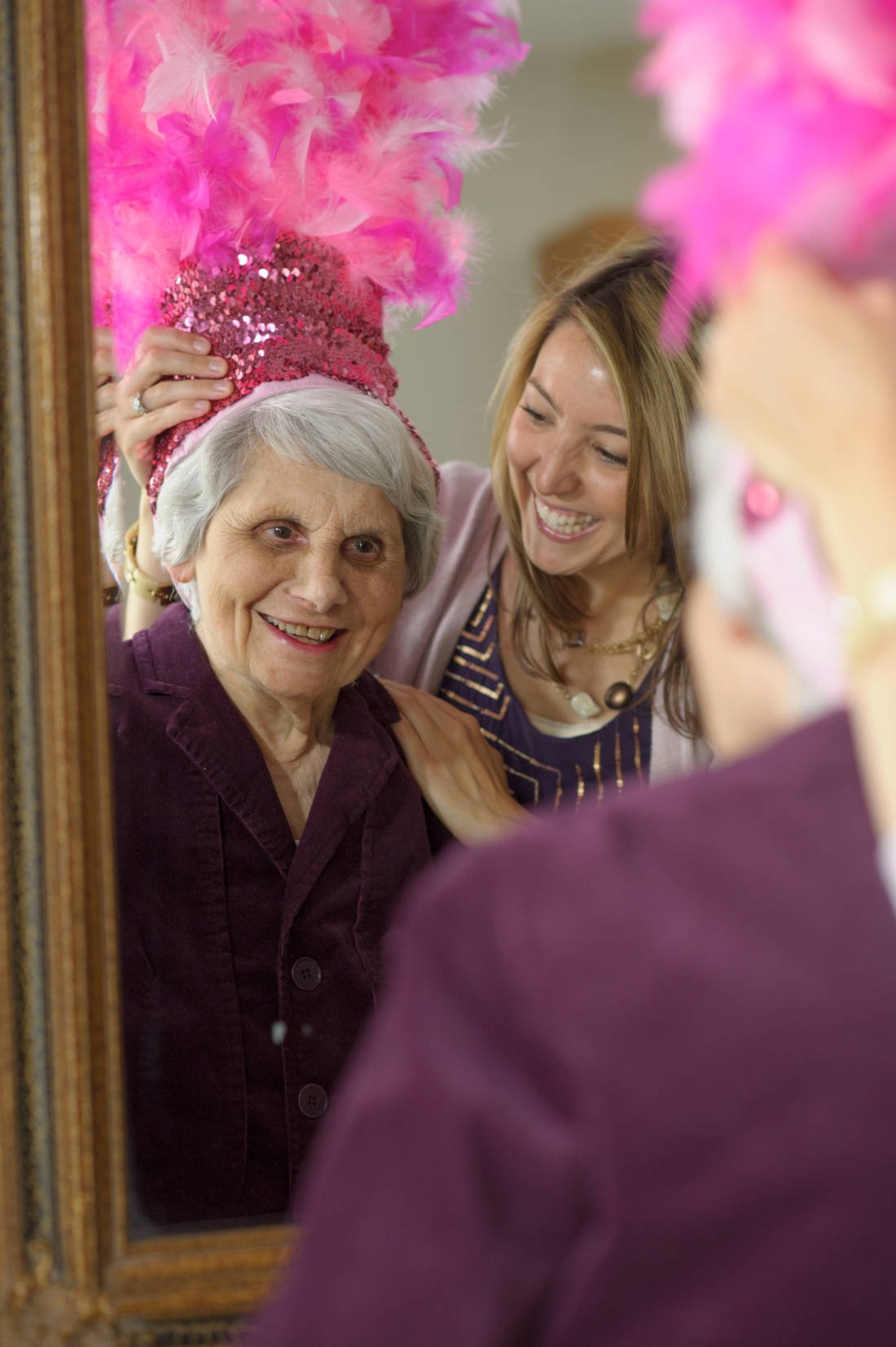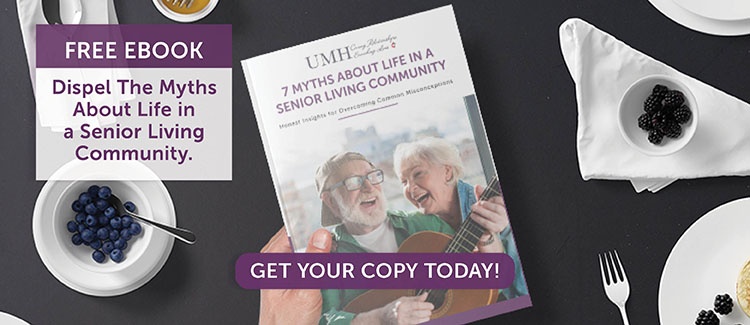The Undeniable Link Between Having Purpose & Aging Well
assisted living | senior nutrition | senior nutrition ct | senior living nutrition | health tips for seniors | Aging & Caregiving
There’s no shortage of reasons why older adults have a difficult time maintaining a strong connection to their inner purpose. With career goals set squarely in the rearview mirror and an empty nest on the road ahead, it’s no surprise that many seniors begin to lose some sense of purpose in their day-to-day lives. But research has shown that seniors with a sense of purpose are less likely to develop Alzheimer's disease, mild cognitive impairment, disabilities, heart attacks, and strokes, and are more likely to live longer than people without this kind of underlying motivation.
According to a study conducted by researchers at the University of California San Diego School of Medicine, there’s a data-driven link between having a sense of meaning and supporting positive physical, mental and cognitive functioning. And there are other studies that make similar correlations. It’s a major topic of interest for seniors who may feel they’ve lost some sense of purpose in life and wonder what that means for their health, well-being, and longevity. Let’s take a closer look.
Stats on Sense of Purpose for Seniors
- A study of 1,475 older adults with a median age of 77 years showed that participants who scored higher on sense of purpose reported lower levels of functional disability, performed better on cognitive tests (episodic memory and speed of processing), and reported better self-rated health and fewer depressive symptoms.
- A sample study of 7,304 men and women aged 50 and older indicated that higher ratings on one’s sense of living a worthwhile and meaningful life were associated with:
- Stronger personal relationships (marriage/partnership, contact with friends)
- Broader social engagement (involvement in civic society, cultural activity, volunteering)
- Less loneliness
- Greater prosperity (wealth, income)
- Better mental and physical health (self-rated health, depressive symptoms, chronic disease)
- Less chronic pain
- Less disability
- Greater upper body strength
- Faster walking
- Less obesity and central adiposity
- More favorable biomarker profiles (C-reactive protein, plasma fibrinogen, white blood cell count, vitamin D, high-density lipoprotein cholesterol)
- Healthier lifestyles (physical activity, fruit, and vegetable consumption, sleep quality, not smoking)
- More time spent in social activities and exercise
- Less time spent alone or watching television
- A study sample drawn from almost 7,000 Health and Retirement Study (HRS) participants who were older than 50 years revealed that a stronger purpose in life was associated with decreased mortality.
Pinpointing One’s Purpose in Later Years
With a good deal of research and study pointing to the overall health and well-being benefits correlated to having a sense of purpose in one’s later years, some seniors may find themselves seeking out ways to cultivate their own. A recent Psychology Today article breaks down nine specific pathways to finding one’s purpose at any age, but especially for older adults.
It makes the important statement that a sense of purpose doesn’t have to be stagnant, and you don't have to choose just one path. You may even be drawn to each one in turn.
1. “Work mission.”
Some older adults are able to continue the paid work they love to do, while others use retirement as an opportunity to try out a second career. Still, others find employment where they can because earning an income is either necessary or a source of independence and pride. Many older adults find meaning in unpaid work such as volunteer work, personal projects, or home improvement.
2. “Love and friendship.”
Finding meaning in the love of another person is an inspiring motivator, and many older people find meaning in relationships with spouses, friends, children, and grandchildren or in taking care of beloved others.
3. “Compassion for others.”
Compassion and concern for others may protect against feelings of meaninglessness. Even making brief connections with relative strangers—acknowledging their presence, wishing them a good day, giving a compliment—can be a source of both meaning and happiness. Listening to someone with an open mind, reaching out to someone who may be lonely, or sending a card can provide good cheer to someone who is down in the dumps.
4. “Small joys and pleasures.”
Just learning to appreciate small pleasures is a habit worth cultivating. Noticing a bird or plant outside your window, having a warming cup of coffee, exchanging hugs—these tiny moments when noticed and absorbed provide a source of satisfaction to both body and brain.
5. “Staying strong and healthy.”
You won’t be able to accomplish much if you lack energy and strength. And just staying strong to perform the normal activities of daily living is an accomplishment in itself, because it means that you can still be independent. Take walks, go to the gym, get a personal trainer, eat right.
6. “Creative projects and play.”
Creative activities, humor, and play of all sorts can provide a sense of purpose for many people. Hobbies, sports, and experiences such as art, travel, music, nature, reading, and culture can touch us deeply and enlarge our capacity for empathy. They may also reduce symptoms of chronic pain and worry by making life more enjoyable. Expressing your identity through art is a way to be happy, a way to affirm who you are, and a way to find purpose.
7. “Contributing to the repair and improvement of the world—or at least your corner of it.”
Making a contribution to your society is a wonderful way to find a purpose greater than yourself. There is an infinite number of ways to do this. Some people take up a social justice cause that is meaningful to them, while others find a unique niche.
8. “Leaving a legacy.”
This is not just about ensuring the smooth passage of your assets to your children or other heirs but also contributing to your family or to the world in many of the ways listed above. It’s about asking, "What kind of gifts do I want to leave to the world?"
9. “Bearing suffering with grace, courage, and dignity.”
Meeting the challenges of aging with acceptance and courage might become a mission in itself. Enduring suffering could actually provide purpose in life, and meaning is possible in spite of it.
Understanding Where Purpose Plays Out Best
The truth is that seniors who find themselves isolated from the people and sense of purpose that once fueled them are prone to declines in physical, mental, and emotional health. Often, it’s because they’re lacking adequate opportunities for human connection, as they struggle to stay social, active, and fulfilled.
For lots of older adults, a senior living community is a very thing that gives them back the connection and sense of purpose they need to thrive. It’s the support system they need to live more independently and seek out the passion and purpose they crave for aging well.
To find out how United Methodist Homes provides a wealth of offerings and opportunities to support the health and wellbeing of our residents, contact us today or schedule a complimentary visit now. For additional tips on senior health and lifestyle issues, check out our blog.
About Marissa Salvesen
My journey into the world of senior living began when I started working for United Methodist Homes in 2010. Starting as an Activities Director at one of our award-winning assisted and independent living communities and then transitioning to Marketing and Promotions Manager for UMH, I now work as the Manager of Mission Development, fostering the Mission and Values of our organization. I love sharing stories about the many ways we build meaningful relationships and enrich the lives of those we serve, and am proud to be part of building UMH’s 140-year legacy of caring. Wondering what makes our communities such special places to live and work? Connect with me and find out!

Our Blog is a 2016 Platinum Generations Award Winner! The Generations Award is an annual international competition for excellence in senior marketing recognizing professionals who have communicated to the 50+ Mature Markets.




